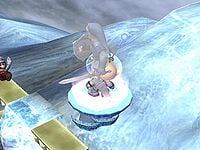Revival platform: Difference between revisions
No edit summary Tag: Mobile edit |
No edit summary |
||
| Line 1: | Line 1: | ||
{{ArticleIcons| | {{ArticleIcons|series=y}} | ||
[[Image:Revival platform 1.gif|thumb|The revival platform in ''[[Super Smash Bros.]]'']]The '''revival platform''' is a special platform in all ''Smash Bros.'' games, that appears after a player has been [[KO]]'d, and comes with the revived character. These platforms disappear as soon as the player gets off of it. If the player does not act, the platform will disappear by itself after 5 seconds. This platform can only be boarded by the KO'd character and only when they have been KO'd. It cannot be boarded at any other time. This is mainly because it's just a graphical representation of the player's return, instead of the character appearing out of nowhere. More than one platform can be on the screen at once, one for each KO'd player, appearing next to each other. | [[Image:Revival platform 1.gif|thumb|The revival platform in ''[[Super Smash Bros.]]'']]The '''revival platform''' is a special platform in all ''Smash Bros.'' games, that appears after a player has been [[KO]]'d, and comes with the revived character. These platforms disappear as soon as the player gets off of it. If the player does not act, the platform will disappear by itself after 5 seconds. This platform can only be boarded by the KO'd character and only when they have been KO'd. It cannot be boarded at any other time. This is mainly because it's just a graphical representation of the player's return, instead of the character appearing out of nowhere. More than one platform can be on the screen at once, one for each KO'd player, appearing next to each other. | ||
Revision as of 19:47, November 6, 2014
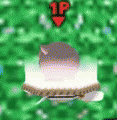
The revival platform is a special platform in all Smash Bros. games, that appears after a player has been KO'd, and comes with the revived character. These platforms disappear as soon as the player gets off of it. If the player does not act, the platform will disappear by itself after 5 seconds. This platform can only be boarded by the KO'd character and only when they have been KO'd. It cannot be boarded at any other time. This is mainly because it's just a graphical representation of the player's return, instead of the character appearing out of nowhere. More than one platform can be on the screen at once, one for each KO'd player, appearing next to each other.
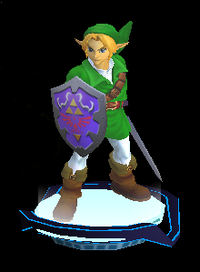
One advantage of this platform is that the character is invincible the entire time they are on the platform. In Brawl, it is commonly used to avoid characters using a Final Smash. In addition, many players utilize the invincibility to plan out their strategy and gather his or her thoughts. After dropping down from the platform, the character has a further period of invincibility to aid their descent from it.
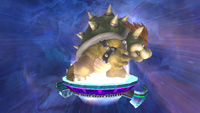
The animation to the platforms hasn't changed much over the four games. After a KO, the character will immediately just drop from the sky on the blue platform. The original game had a slightly different addition, though; upon appearing on the platform, characters would be lying down, and then would get up while the platform descended.
In Super Smash Bros., a character gets the mystic bonus for being on a revival platform when his/her opponent is KO'd. In Melee, the player gets the Angelic bonus point for ending the match this way.
Origin
The revival platform originates from the game Mario Bros. When Mario or Luigi dies, he respawns on a small platform, followed by a short melody. While on the platform, the plumber gains invincibility. The melody that plays when Mario or Luigi respawns is not in the Smash Bros. universe however, but the revival platform itself is.
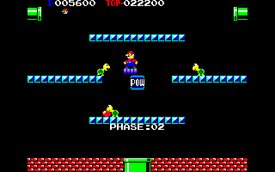
Trivia
- The Ice Climbers have the largest revival platform for playable characters.
- Giga Bowser has the largest revival platform for non-playable characters.
- Revival platforms do not appear in the Subspace Emissary.
- There is a glitch that if a player is KO'd while another is descending on their revival platform, both characters' platforms will be in the same location, instead of next to each other.
